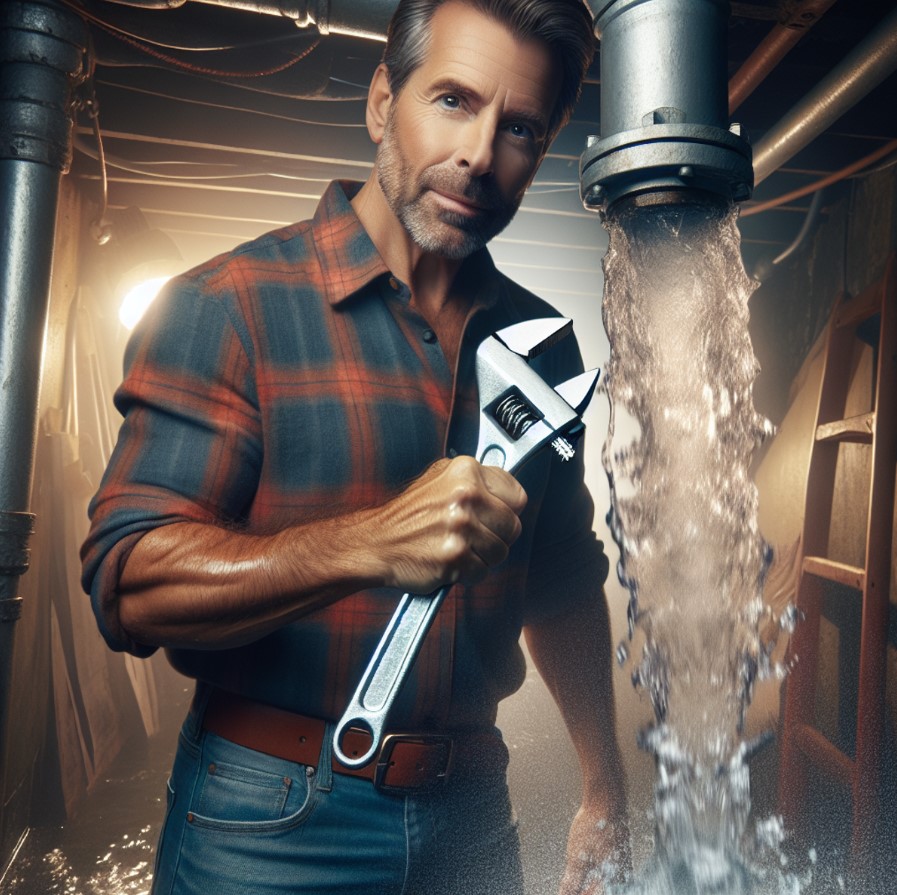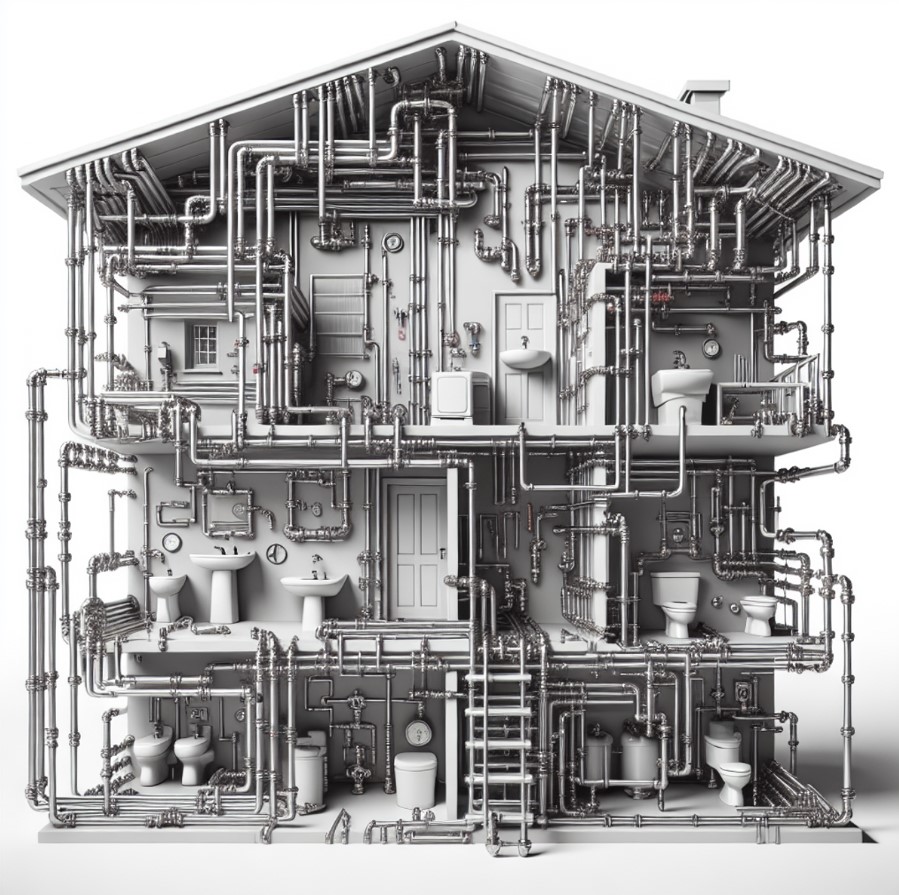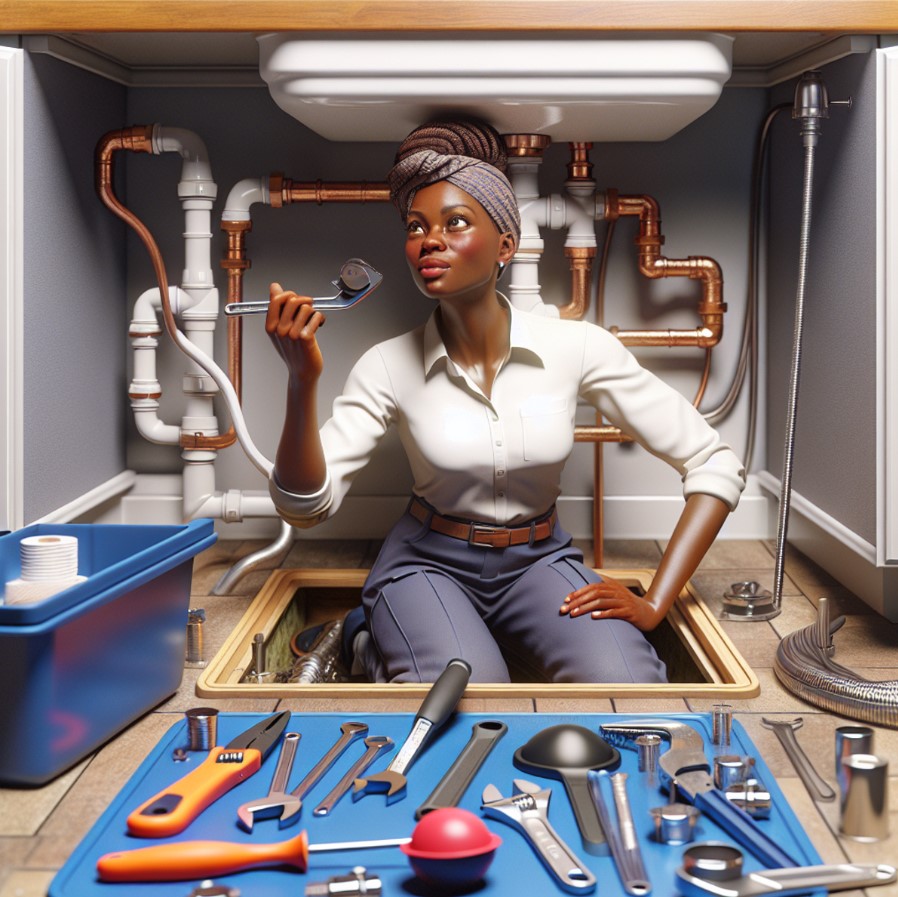
Table of Contents
The allure of DIY solutions has reached every part of home maintenance, including plumbing. But attempting DIY plumbing repairs without the necessary expertise can lead to what industry professionals call “DIY plumbing disasters.” These are accidents that not only cause immediate inconvenience but also result in long-term damage that can be much more expensive than hiring a professional in the first place.
It’s important to understand the significance of addressing DIY plumbing disasters because they have the potential to disrupt your daily life and decrease the value of your property. Water damage from a burst pipe, leaks caused by improperly installed fixtures, or a toilet that wasn’t fixed correctly can quickly turn into major issues that require extensive and costly repairs.
Avoiding plumbing disasters isn’t just about saving money; it’s about protecting the comfort and safety of your home. As an award-winning plumbing company with over 40 years of experience in Oceanside, we’ve witnessed firsthand the consequences of well-meaning but unsuccessful attempts at plumbing. This article aims to help homeowners navigate the challenges of DIY plumbing, offering insights into why certain tasks are better left to licensed plumbers like those at Plumbersoceanside.com, recognized as one of the top 3 Plumbing companies in Oceanside, California.
By reading this article, you’ll gain knowledge on how to avoid expensive mistakes and understand when it’s necessary to stop DIY-ing and hire a professional plumber instead.
Understanding DIY Plumbing and Its Risks
DIY plumbing, a popular choice for many homeowners, involves undertaking plumbing tasks without professional intervention. Motivated by factors such as cost-saving or the feeling of accomplishment, individuals often take on the challenge of fixing a leaky faucet or unclogging a drain themselves.
Common DIY Plumbing Projects
Here are some examples of common plumbing projects that homeowners may attempt to tackle on their own:
- Fixing leaky faucets and showerheads
- Unclogging drains
- Replacing or repairing flush mechanisms in toilets
- Installing new fixtures, such as sinks or dishwashers
While carrying out these tasks may seem straightforward, they can present significant risks if not handled correctly. A simple error during a DIY project can escalate into a major issue such as water damage to your home or, worse yet, cause harm to your plumbing system.
Risks of DIY Plumbing Repairs
Several risks and dangers are associated with inexperienced DIY repairs:
- Incorrect Installation: Without proper knowledge and experience, hardware may be installed incorrectly which can lead to leaks or malfunctions.
- Safety Hazards: Plumbing work often involves working with water and electricity simultaneously. Inexperience can lead to potential electrocution or other injuries.
- Structural Damage: Mistakes such as drilling into pipes or misjudging water pressure can cause extensive damage to your home’s structure.
- Legal Issues: Without the necessary permits, certain plumbing work may violate local building codes, leading to fines or problems when selling your home.
These examples underscore the need for caution when embarking on a DIY plumbing project. While it might appear cost-effective initially, one mistake can turn a minor repair into an expensive catastrophe.
In the following sections, we will discuss important information that you should know before starting any DIY plumbing work. We will also share valuable tips on how to avoid costly disasters. By understanding the limitations of DIY efforts and exploring safer alternatives, we aim to provide comprehensive guidance for maintaining a healthy plumbing system in your home.
Essential Knowledge Before You Start: The Basics of Your Plumbing System

A residential plumbing system is a complex network crucial for delivering clean water and disposing of waste. Gaining an understanding of this system’s components is imperative for any homeowner, particularly when handling any form of DIY plumbing work.
Key Components of a Residential Plumbing System:
- Pipes: These are the arteries of your plumbing system, responsible for transporting water in and out of your home. Common materials include PVC, PEX, galvanized steel, and copper.
- Fixtures: Sinks, toilets, bathtubs, and showers are the most interacted-with parts of a plumbing system. They draw fresh water and dispose of waste.
- Drains: Every fixture has a drain that carries waste water away to the sewer or septic system.
- Vents: Plumbing vents prevent air lock by allowing air into the plumbing system; they’re essential for proper wastewater movement.
- Traps: Located beneath or within fixtures, traps are curved pipes that retain a small amount of water to prevent sewer gases from entering the home.
The Importance of Shutoff Valves:
Shutoff valves are critical during emergencies or routine maintenance. Knowing their location can prevent minor leaks from escalating into full-blown floods. Each fixture should have its own shutoff valve; there’s also a main valve that controls water flow to the entire property.
Types of Pipes in Plumbing:
Different pipe materials serve various functions within your plumbing system:
- Copper Pipe: Renowned for durability and reliability, copper piping is often used for hot and cold water supply lines. It requires soldering skills for installation and repair, making it a challenging material for inexperienced DIY enthusiasts.
- PVC Pipe: Lightweight and easy to work with, PVC is commonly found in waste lines and vent stacks but not suitable for hot water lines due to its heat sensitivity.
- PEX Pipe: Flexible and color-coded for hot and cold lines, PEX is increasingly popular in modern homes due to its ease of installation.
Understanding these components lays the foundation for safe DIY plumbing practices. However, attempting repairs on critical elements like copper pipes should be approached with caution due to the technical skill required.
Tips for Avoiding Costly DIY Plumbing Disasters
Embarking on a DIY plumbing project can be both rewarding and economical, but it is crucial to approach these tasks with caution and proper preparation. Here are some strategies to enhance your skills while safeguarding your home from potential mishaps:
Start Small, Think Big: Gradually Building Your DIY Skills While Minimizing Risk
- Tackle minor repairs first: Gain confidence by starting with simple tasks such as replacing a washer in a leaky faucet or unclogging a drain.
- Incremental learning: With each small project, you’ll build a solid foundation of skills that will prepare you for more complex challenges.
Essential Tools for Every DIY Plumber
Having the right tools is fundamental for any successful DIY plumbing endeavor. Equip yourself with the following must-haves:
- Adjustable wrenches: These are versatile for tightening and loosening nuts and bolts of various sizes.
- Pipe wrench: A necessity for gripping and turning pipes, always use a pair to stabilize one pipe while turning another.
- Plunger: Ideal for dislodging clogs in toilets, sinks, and drains.
- Plumber’s tape: Also known as thread seal tape, it’s applied to pipe threads to prevent leaks.
- Hacksaw: Cuts through pipes, screws, and bolts.
- Tubing cutter: Provides clean cuts through copper pipes.
Safety Note: Always wear protective gear such as gloves and eyewear when handling tools. Ensure you understand the correct usage of each tool to avoid injury and damage.
Research and Planning: The Blueprint for Success
Before commencing with a plumbing project guidance is key:
- Comprehensive research: Investigate the task at hand thoroughly. Understand what can go wrong and how to respond if it does.
- Step-by-step guides and tutorials: Leverage high-quality online resources that provide clear instructions. Look for videos or articles from reputable sources that break down complex tasks into manageable steps.
By adhering to these DIY plumbing tips, homeowners can confidently address minor issues while recognizing their limits. Proper tool utilization coupled with meticulous research equips you with the knowledge to perform basic plumbing maintenance safely. Remember, preparedness is your best defense against potential disasters.
Knowing When to Call in the Experts: The Limits of DIY Plumbing

While embracing a DIY spirit can be both rewarding and cost-effective for minor plumbing fixes, recognizing the boundaries of your expertise is crucial. There are distinct advantages to hiring a professional plumber for plumbing repairs, especially when faced with complex or hazardous situations.
Advantages of Hiring a Licensed Plumber
- Expert Assessment: A skilled plumber can quickly diagnose issues that might not be apparent to the untrained eye, preventing further complications.
- Quality Workmanship: With years of training and experience, professionals ensure that repairs are conducted to industry standards.
- Safety: Plumbing repairs can involve exposure to sewage, gas lines, and high water pressure – risks that licensed plumbers are trained to handle.
- Guaranteed Solutions: Professionals often offer warranties on their work, giving you peace of mind and protection against future problems.
Common DIY Mistakes
Attempting plumbing repairs without adequate knowledge or experience can lead to several common mistakes:
- Misdiagnosis: Incorrectly identifying the problem may result in ineffective or temporary fixes.
- Over-tightening Connections: This can cause broken bolts or stripped threads, leading to leaks.
- Mismatching Materials: Incompatible materials can accelerate corrosion, leading to leaks or pipe damage.
Cost Considerations of DIY Errors
Unsuccessful DIY attempts not only require additional time and resources but also increase costs when professional intervention becomes necessary. Consider the following:
- Escalating Issues: A small leak can turn into significant water damage if not addressed correctly, inflating repair costs exponentially.
- Tool Investments: Specialty tools required for certain jobs might be expensive and impractical for one-time use.
- Time Investment: The time spent learning and attempting repairs could outweigh the convenience and efficiency of professional service.
Recognizing when a project exceeds personal skill limits is essential. For intricate or dangerous work, entrusting a skilled plumber ensures the job is done right the first time. By avoiding overambition in plumbing endeavors, homeowners safeguard their property and finances.
Exploring Safer Alternatives to DIY Approaches
Dealing with plumbing issues doesn’t always require taking a DIY approach. Preventive measures, particularly regular inspection and maintenance, play a vital role in avoiding sudden plumbing emergencies. Proactive measures not only prevent minor issues from escalating into major problems, but they also ensure the longevity of your plumbing system.
Regular plumbing maintenance should be considered a necessity rather than an option. It is akin to a health check-up for your home’s plumbing system. This involves checking pipes for leaks or corrosion, inspecting drains for potential blockages, testing water pressure, assessing the condition of fixtures such as faucets and showerheads, and verifying the operation of shutoff valves.
In addition to these tasks, a comprehensive maintenance routine includes:
- Flushing out water heaters to remove sediment build-up
- Inspecting sewer lines for any signs of root intrusion or blockage
- Checking toilets for hidden leaks or running issues
- Assessing outdoor hose bibs for leaks or damage
While some homeowners may feel confident performing these tasks themselves, many find that enlisting the help of professional plumbing services offers significant advantages. A trained eye can spot potential problems that an untrained individual might miss.
Another critical aspect of preventive care is scheduling periodic check-ups with a qualified plumber. These professionals have the expertise to identify potential issues before they escalate into costly repairs or replacements.
For instance, an inefficient water heater may go unnoticed by most homeowners until it completely breaks down. A professional plumber can identify signs of wear and tear during a routine check-up and recommend appropriate measures such as repair or replacement—saving you the inconvenience of an unexpected breakdown and potentially high replacement costs.
In short, opting for professional plumbing services means entrusting your home’s plumbing system to experts who have the knowledge and tools to keep it running smoothly. Their proficiency in spotting early warning signs helps in mitigating risks and ensuring that your home remains a comfortable living space.
For those who have always taken a DIY approach to their plumbing, considering professional services as a safer alternative is a worthwhile shift in perspective. It’s not just about problem-solving; it’s also about problem prevention.
Conclusion
The main point of this article is that although it may be tempting to do your own plumbing work, it’s not always the best choice. Plumbing issues, whether it’s a clogged drain or a leaky toilet, are often more complex than they seem. In these situations, it’s essential to have the skills and knowledge of professional plumbers.
As a homeowner, there are certainly simple tasks that you can handle yourself to maintain your plumbing system:
- Regular cleaning of drains to prevent blockages
- Routine inspection for minor leaks and rust
- Flushing the hot water heater to remove sediment build-up
- Replacing worn-out washers in faucets
These are safe DIY tasks that contribute to maintaining a healthy and efficient plumbing system. But when faced with complex issues, it’s important to prioritize professional expertise instead of attempting to fix them on your own. This decision can save you a lot of time, money, and frustration.
Plumbersoceanside.com is an experienced company with a team of certified plumbers. They have been recognized for their outstanding service and have been voted one of the top 3 plumbing companies in Oceanside, California. By choosing them, you can be confident in receiving reliable solutions for all your plumbing needs while avoiding potential DIY disasters.
Take the right step now! Make a wise choice and trust professionals with the plumbing needs of your home.
FAQs (Frequently Asked Questions)
What are DIY plumbing disasters and why is it important to address them?
DIY plumbing disasters refer to the costly mistakes homeowners make when attempting plumbing repairs or projects without professional expertise. It is important to address them to avoid further damage, additional costs, and potential safety hazards.
What is DIY plumbing and why do people attempt it?
DIY plumbing involves homeowners attempting to perform plumbing repairs or projects on their own without professional assistance. Many people attempt it to save money and gain a sense of accomplishment by completing home improvement tasks themselves.
What are the key components of a typical residential plumbing system?
The key components of a typical residential plumbing system include pipes, fixtures, drains, and shutoff valves. It is important for homeowners to have a good understanding of these components for emergency situations and regular maintenance.
What tips can help in avoiding costly DIY plumbing disasters?
To avoid costly DIY plumbing disasters, homeowners should start small and gradually build their DIY skills while minimizing risk. They should also equip themselves with essential tools, conduct thorough research and planning, and find reliable step-by-step guides or tutorials online before starting any DIY plumbing project.
When should homeowners call in professional plumbers for plumbing repairs?
Homeowners should consider hiring licensed plumbers for complex or hazardous plumbing issues. Common mistakes made during DIY repairs can lead to further damage, making professional intervention necessary. Homeowners should weigh the cost considerations of DIY errors against the expertise of professional plumbers.
How can homeowners explore safer alternatives to DIY approaches in plumbing?
Homeowners can explore safer alternatives to DIY approaches by prioritizing preventive measures such as regular inspection and maintenance. Suggesting periodic check-ups by a qualified plumber is a proactive way to identify potential issues before they escalate into emergencies.